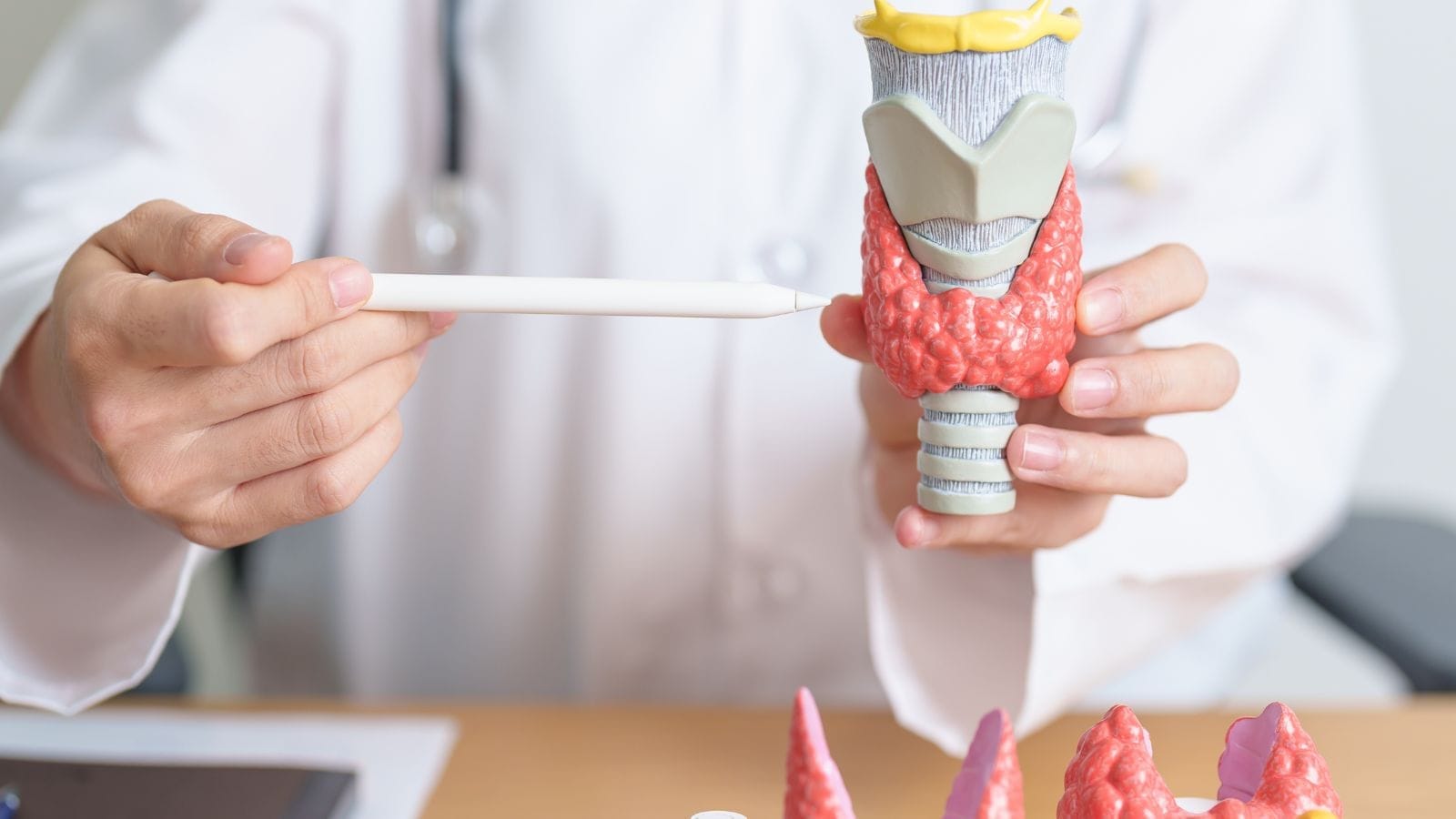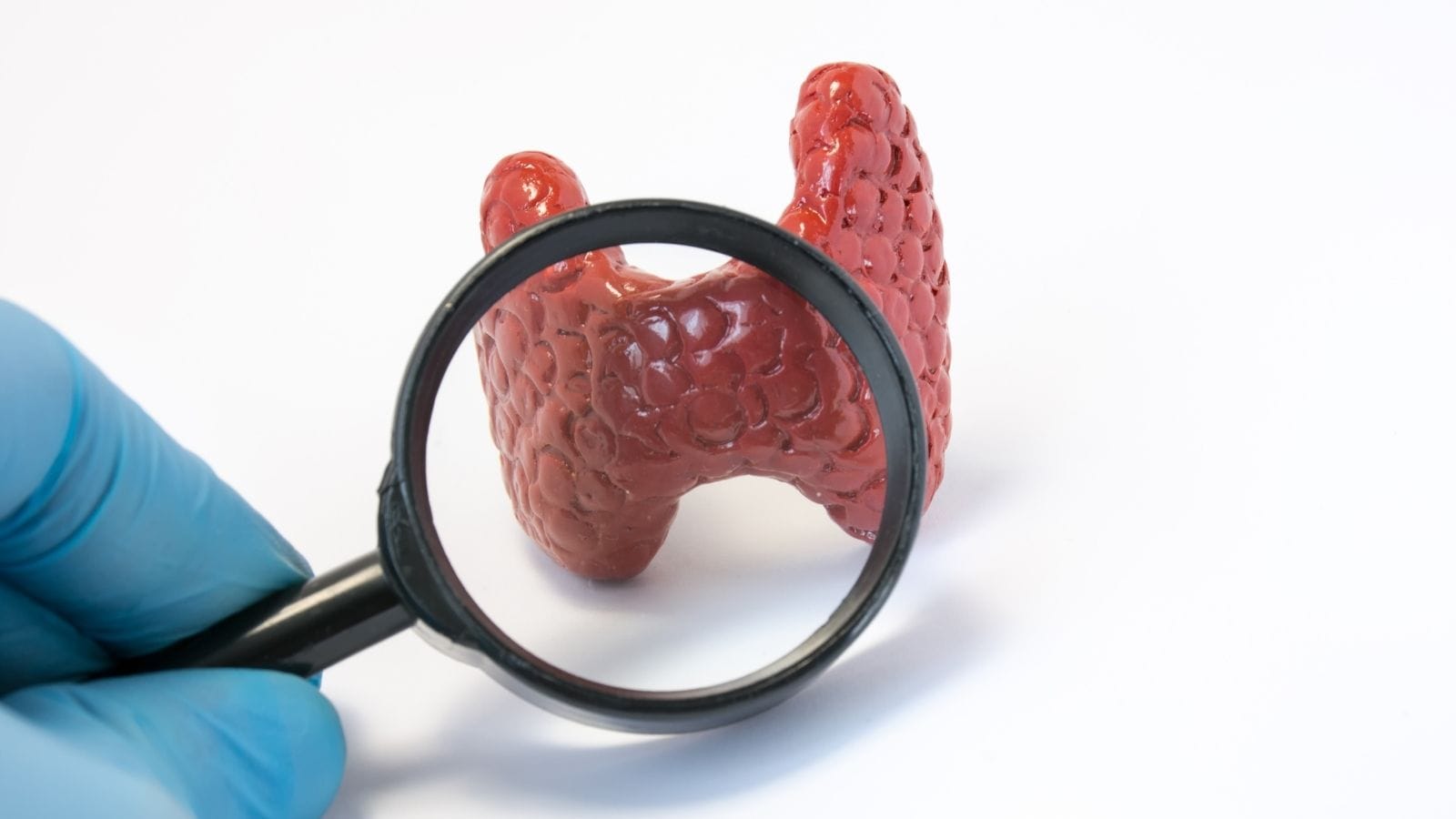Iodine is an essential trace element required for the production of thyroid hormones. It regulates metabolism, growth, and brain development, making adequate intake crucial for overall health throughout life.
Daily iodine requirement varies by age and physiological status. Adults generally need around 150 micrograms, while pregnant and breastfeeding women require higher amounts to support fetal and infant development.
Iodine deficiency leads to goiter, hypothyroidism, and developmental disorders. Salt iodization programs have significantly reduced deficiency worldwide, protecting populations from thyroid-related diseases.
Adequate iodine intake also contributes to immune function and cognitive performance. Dietary sources include iodized salt, seafood, dairy products, and seaweed, supporting optimal thyroid and systemic health.
| Element Name | Iodine |
| Chemical Symbol | I |
| Description | Iodine is an essential trace element for the human body, playing a vital role especially in the production of thyroid hormones. |
| Functions | Used in the synthesis of thyroid hormones (T3 and T4), important for growth, development, metabolism regulation, and brain functions. |
| Deficiency Symptoms | Goiter, fatigue, feeling cold, weight gain, dry skin, developmental delay in children, increased risk of miscarriage and birth defects during pregnancy. |
| Excess Symptoms | Hyperthyroidism, thyroid enlargement, rapid heartbeat, weight loss, irritability, sweating; toxic effects may occur with excessive intake. |
| Daily Requirement | Recommended daily iodine intake is 150 mcg for adults, 220 mcg during pregnancy, and 290 mcg while breastfeeding. |
| Sources | Iodized salt, seafood (fish, seaweed), dairy products, eggs, some vegetables (grown in iodine-rich soil). |
| Deficiency Risk Factors | Using non-iodized salt, diets based on foods grown in iodine-poor soil, pregnancy, breastfeeding, vegan diets. |
| Prevention of Deficiency | Use of iodized salt, iodine supplementation (especially in pregnancy), consumption of iodine-rich foods. |
| Toxicity and Side Effects | Excessive iodine intake may negatively affect the thyroid gland; recommended amounts should not be exceeded. |
| Uses | Medical imaging (iodine-based contrast agents), disinfection (iodine solutions), supplementation in the treatment of hypothyroidism. |
What Is Iodine and Why Is It Important?
Iodine is an essential mineral for the human body, especially involved in the synthesis of thyroid hormones. These hormones regulate metabolic rate and affect a wide range of physiological functions, including energy balance. In cases of iodine deficiency, the thyroid gland cannot produce enough hormone, leading to thyroid dysfunctions such as hypothyroidism.
Iodine intake is especially critical during pregnancy and childhood for brain development. Sufficient iodine during these periods is vital to prevent irreversible damage to the developing brain.
The benefits of iodine go beyond thyroid functions; it also supports the immune system. Iodine displays antioxidant properties, protecting cells from oxidative stress and neutralizing reactive oxygen species. Thus, it strengthens the body’s defense mechanisms against pathogens.
- Contributes to the regulation of metabolic rate and energy balance.
- Prevents irreversible intellectual disabilities with adequate intake during pregnancy and childhood.
- Protects cells against oxidative stress and supports immunity through its antioxidant effects.
- Demonstrates antiviral, antifungal, and bactericidal properties, making it effective in combating pathogens.
Iodine is a mineral that must be consumed regularly as its deficiency can lead to serious health problems.
What Are the Daily Iodine Requirements?
Daily iodine requirements vary depending on age, gender, and life stage. The increased need for iodine during pregnancy and lactation is especially important for the production of thyroid hormones and healthy fetal development. Adequate iodine intake at every age is vital for healthy growth and development.
- Infants (0–12 months): 110–130 µg per day.
- Children (1–8 years): 90 µg per day.
- Children (9–13 years): 120 µg per day.
- Adolescents (14+ years) and adults: 150 µg per day.
- Pregnant women: 220–250 µg per day for fetal development.
- Lactating women: 290 µg per day to provide iodine for the baby.
During pregnancy, iodine supports fetal nervous system and brain development, and deficiency in this period can cause serious developmental problems. In adults, iodine deficiency can cause goiter and hypothyroidism. However, excessive iodine intake can lead to risks such as hyperthyroidism and hypothyroidism. For adults, the safe upper limit is set at 1,100 µg per day. Maintaining iodine balance is essential for health, and these values should be considered.
How Does Iodine Benefit the Body?
Iodine is a fundamental trace element providing various benefits. It is an essential component of the thyroid hormones T3 and T4, which regulate metabolism, energy production, cell renewal, and growth. Insufficient iodine intake causes hypothyroidism, resulting in symptoms like fatigue, weight gain, and sensitivity to cold.
During pregnancy, adequate iodine is vital for fetal brain development. Correct neurological development in early childhood reduces the risk of mental retardation. Even mild deficiency can lower cognitive function and learning ability in children.
Iodine also has immune-supporting properties. Its antioxidant effect protects cells against oxidative stress and provides resistance to infections. Acting as a scavenger of reactive oxygen species, iodine helps the immune system respond more effectively to infections.
Finally, iodine contributes to skin health and supports a healthy appearance. With its antimicrobial properties, it protects the skin from infections and enables faster regeneration of skin cells.
What Are the Main Sources of Iodine?
Iodine is a crucial mineral for the body and must be consumed in sufficient amounts. The main sources include a variety of foods, which help prevent iodine deficiency. Seaweed is among the richest natural sources of iodine, with types such as kelp, nori, and wakame containing high levels. The iodine content of seaweed can vary depending on type and preparation method.
Dairy products play an important role in meeting the daily iodine requirement. Milk, yogurt, and cheese—enriched by iodine added to animal feed—are especially good sources. For example, a glass of milk can provide 40–60% of the daily iodine requirement.
Seafood, including cod, tuna, and shrimp, are rich sources of iodine. For example, a 3-ounce serving of cod provides about 99 micrograms of iodine. Eating seafood is an effective way to increase iodine intake.
Iodized salt is commonly used in many countries to prevent iodine deficiency, making it an easy and economical source. Just one gram of iodized salt contains about 50–60 micrograms of iodine.
Eggs also stand out for their iodine content; the yolk contains about 24 micrograms. Additionally, some fortified foods, breads, and cereals may provide iodine depending on local regulations.
What Happens If You Don’t Get Enough Iodine?
Iodine deficiency seriously affects healthy body function and causes many health issues. The most common result is goiter, as the thyroid gland enlarges to compensate for insufficient iodine. Severe goiter may lead to swallowing and breathing difficulties. Iodine deficiency can cause hypothyroidism, leading to symptoms like fatigue, weight gain, and sensitivity to cold.
Iodine is essential for brain development and cognitive function. In pregnant women and developing children, deficiency may lead to irreversible intellectual disabilities and cretinism. Even mild deficiency can decrease cognitive function in children, resulting in a reduction of overall IQ in the population. In adults, low iodine is linked to decreased productivity and cognitive ability.
Other common symptoms include dry skin, hair loss, and brittle nails—results of decreased metabolism and reduced energy production. Muscle weakness and fatigue are also common in people with iodine deficiency.
The use of iodized salt plays an important role in protecting public health in regions where deficiency is common. Universal salt iodization programs are widely implemented worldwide to prevent deficiency.
Frequently Asked Questions

Which foods contain iodine?
Fish, shellfish, and especially seaweed are high in iodine. Dairy products such as milk, yogurt, and cheese are also good sources. Egg yolk contains plenty of iodine. Iodized table salt helps meet daily needs. Some commercial breads are made with iodine-fortified flour. The iodine content of food varies according to the soil where it’s grown and animal feed. Consumption of these foods is particularly important in areas at risk for deficiency.
What does iodine deficiency cause?
Iodine deficiency can result in insufficient thyroid hormone production, usually causing symptoms like fatigue, weight gain, and sensitivity to cold. Goiter—a swelling in the front of the neck—may develop, and in children, severe cases can cause intellectual disability and growth disorders. In pregnant women, it increases the risk of miscarriage, stillbirth, or birth defects. Other common symptoms include dry skin, hair loss, and mental fog. Iodine deficiency is a condition that should be taken seriously, especially for children and pregnant women.
Who should avoid iodine?
People with hyperthyroidism, dermatitis herpetiformis, or iodine allergy should avoid iodine. Excess iodine intake can disrupt thyroid function, causing goiter or hypothyroidism. People with kidney disease should be cautious, as iodine is excreted primarily via the kidneys. Those taking lithium, certain blood pressure medications, or antithyroid drugs may experience negative interactions with iodine. Pregnant and breastfeeding women should consult a doctor before supplementation; excess iodine can adversely affect the baby’s thyroid health.
How can iodine be obtained naturally?
Iodine can be obtained naturally from certain foods, especially seaweed (such as kombu, nori, wakame, kelp), fish (cod, shrimp, tuna), dairy products, and egg yolks. Using iodized salt also provides iodine. Dried prunes, legumes, and grains are plant sources but contain less iodine compared to seafood.
Can you use iodine if you don’t have a thyroid?
If your thyroid gland has been completely removed, there is no need for extra iodine. Normally, iodine is needed to produce thyroid hormones, but since you cannot produce these naturally, you receive them through synthetic drugs like levothyroxine. Therefore, additional iodine will not benefit you.
Does mineral water contain iodine?
The iodine content of mineral waters varies by source. Some may contain very little, while others, such as certain Norwegian brands, can have as much as 38 µg per 100 ml. This variation depends on the geological structure and mineral composition of the water source.
Do walnuts contain iodine?
Yes, walnuts contain small amounts of iodine—about 2 micrograms per 100 grams. However, this is quite low, so you should turn to higher-iodine foods such as seaweed or iodized salt to meet your needs.
Is rock salt iodized?
Natural rock salt (halite) usually does not contain iodine. However, some commercial brands sell rock salt with added iodine. For example, some Himalayan rock salt products offer 25–40 mg/kg potassium iodate. So, while natural rock salt does not have iodine, some brands fortify it.
Can you get iodine at the pharmacy?
Yes, pharmacies sell iodine in various forms—both as a supplement and as an antiseptic solution. In some countries, like Belgium, iodine tablets are distributed free at pharmacies for nuclear emergencies. Availability depends on local regulations.
Is tincture of iodine the same as pure iodine?
No, tincture of iodine is not the same as pure iodine. Tincture typically contains 2–3% iodine and 2.4% sodium iodide dissolved in a water-alcohol solution, used mainly as an antiseptic. Elemental iodine (I₂) is a pure chemical element and is not directly used as an antiseptic.
How do you know if you’re deficient in iodine?
Iodine deficiency may present as swelling in the neck (goiter), unexpected weight gain, fatigue, weakness, hair loss, dry/flaky skin, sensitivity to cold, slowed heart rate, learning and memory problems, and menstrual irregularities. In pregnant women, it can cause miscarriage, stillbirth, premature birth, or birth defects. Diagnosis usually involves blood tests for thyroid hormone levels; sometimes, imaging studies of the thyroid gland are performed.
Does vitamin D reduce the effect of iodine?
Current research does not show that vitamin D directly reduces the effect of iodine. However, one study found that in pregnant women, severe vitamin D deficiency combined with high iodine intake might increase the risk of thyroid antibodies. This suggests a possible interaction, but not a direct reduction of iodine’s effect by vitamin D.
Does iodine raise TSH?
Iodine supplementation may temporarily increase TSH (thyroid-stimulating hormone) levels. The body does this to increase sodium-iodide transporter expression in the thyroid gland to adapt to higher iodine intake. This TSH rise is usually short-lived and normalizes as the body adapts. Both deficiency and excess iodine can cause TSH imbalances and disrupt thyroid function.

Girişimsel Radyoloji ve Nöroradyoloji Uzmanı Prof. Dr. Özgür Kılıçkesmez, 1997 yılında Cerrahpaşa Tıp Fakültesi’nden mezun oldu. Uzmanlık eğitimini İstanbul Eğitim ve Araştırma Hastanesi’nde tamamladı. Londra’da girişimsel radyoloji ve onkoloji alanında eğitim aldı. İstanbul Çam ve Sakura Şehir Hastanesi’nde girişimsel radyoloji bölümünü kurdu ve 2020 yılında profesör oldu. Çok sayıda uluslararası ödül ve sertifikaya sahip olan Kılıçkesmez’in 150’den fazla bilimsel yayını bulunmakta ve 1500’den fazla atıf almıştır. Halen Medicana Ataköy Hastanesi’nde görev yapmaktadır.









Vaka Örnekleri